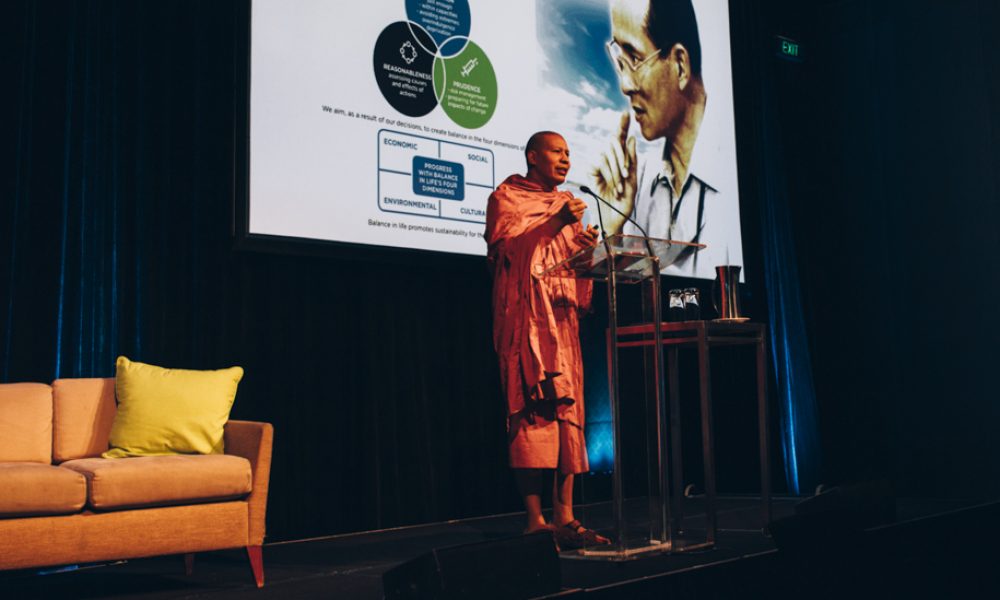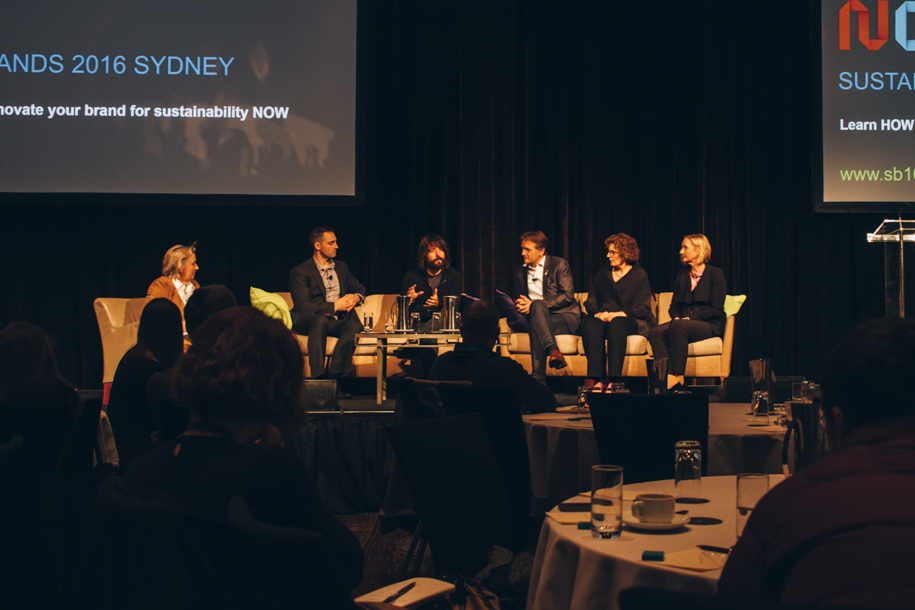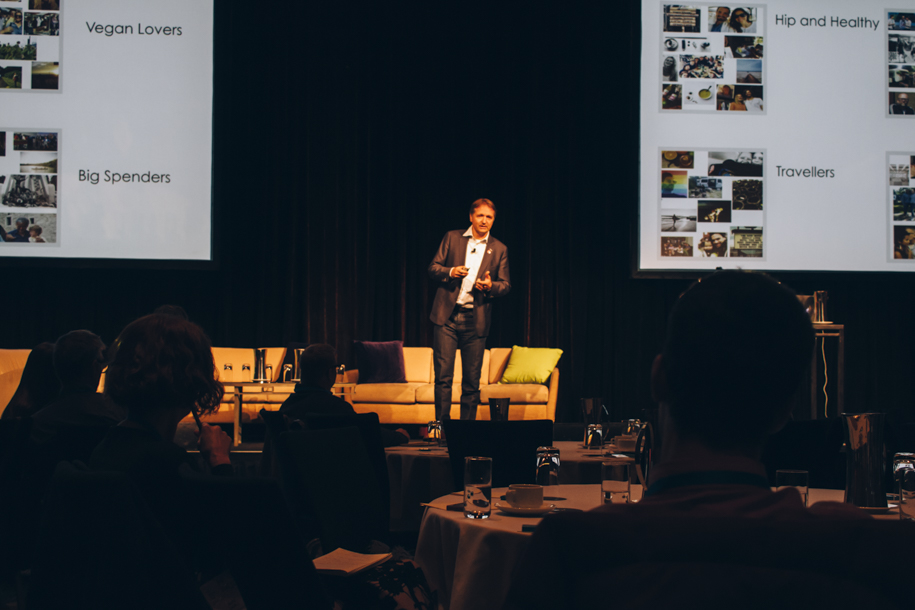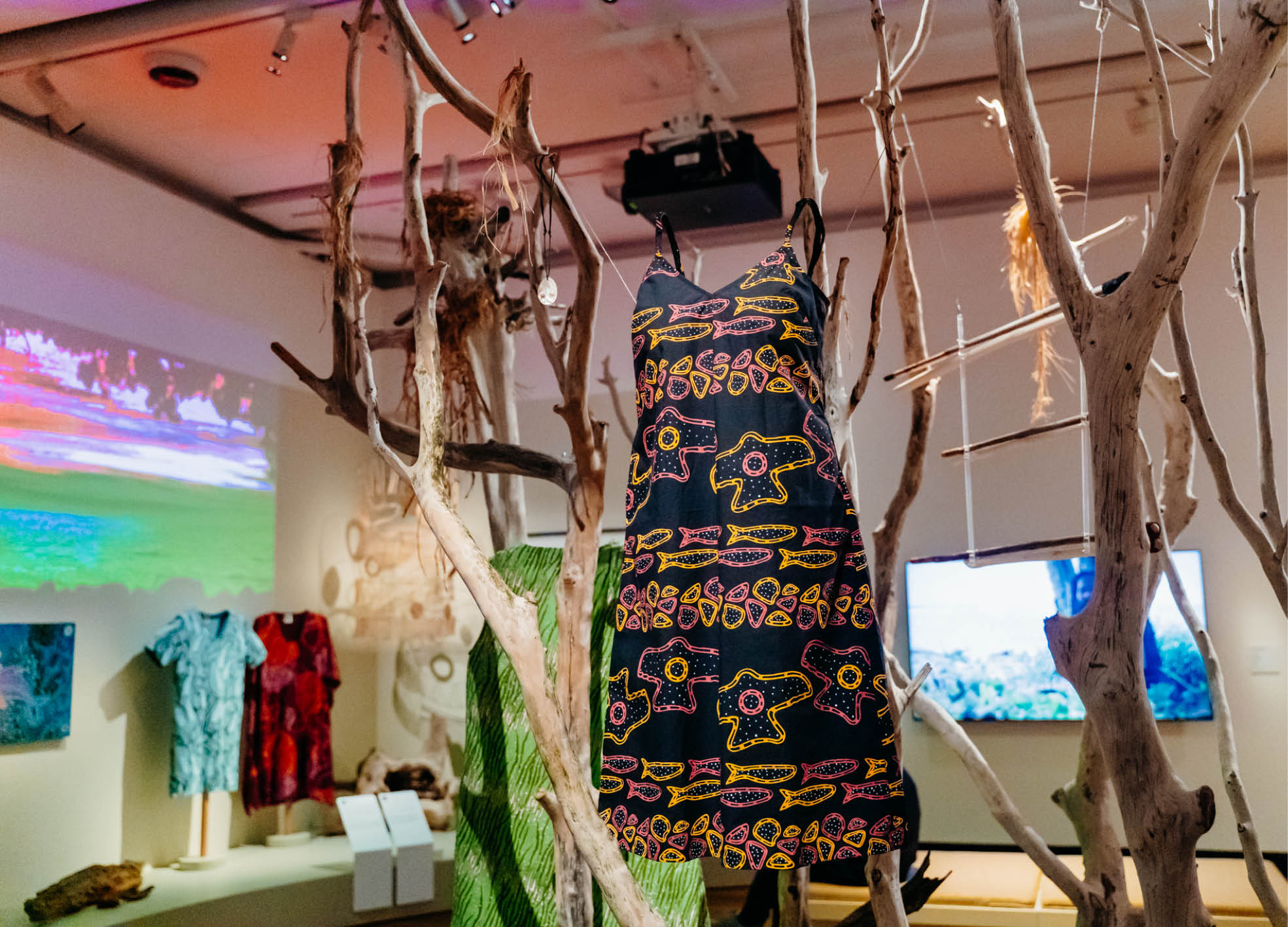Sustainable Brands Sydney

- Words by Peppermint
Sustainability is a team sport. Don’t do it alone.
That’s Tim Loftus, the sustainability manager from outdoor adventure wear brand Kathmandu, speaking at the Sustainable Brands conference in Sydney recently. Sustainable Brands is a roving global event, having started in New Orleans in 2006, and now reaching six continents, with the Sydney rendition its first appearance in Australia.
Across three days of lectures and workshops, attendees heard inspiring stories from TerraCycle, MUD Jeans, OzHarvest, Emma & Tom’s, Serendipity Ice Cream, Kathmandu and ecostore, amongst strategists, academics, CEOs and heads of communications and marketing.
Both local and global speakers – from typically conventional big business down to the Millennial entrepreneur – delved into the technologies, skills, ideas and collaborations that drive their brands forward within a sustainable economy framework.

Each quickly-make-a-cup-of-tea break was like speed dating with equivalent minds from another brand or industry. Snatches of critical conversation on topics just discussed on the stage lead to brief introductions, business cards swapped, new friendships made and global community grown.
A strong takeaway was that business has the power to do good. While the Australian Government has committed to keeping global warming below two degrees as part of the Paris climate change agreement, there has been little action to match this verbal responsibility. “Governments still aren’t framing markets, so businesses are taking the lead,” Sally Uren from Forum for the Future told the conference on day one.
This is where sustainably minded brands come into play – businesses with environmental and social purpose at their core. “It isn’t good enough to be less bad, we actually need to be net positive,” Uren continued. “Simply minimising isn’t enough, we need to put more back than we’re taking out. We don’t know how to do it yet, but that’s not stopping us.”
So we’re feeling our way along this journey of making purpose-led businesses scalable so that good at work ripples further afield – into consumer habits, societal lifestyle choices and, perhaps one day, government policymaking.

A prominent theme across the conference was to create with the mindset that you have a mission with a company, not a company with a mission. But a factor that seemed a challenge to all industries – and with no one clear formula for success – was how best to communicate a brand’s story and the ethics and values at their core, and, in turn, engage more meaningfully with consumers.
It’s sometimes all too easy to see brands as a big enterprise without a face – operating without humans and ethics and heart. But it’s in telling the story of the humans behind the supply chain, and the brand’s commitment to the environment, that brings about that deeper connection.
Telling the story of the cotton farmer who grows the organic cotton that then gets spun into thread by the hands of other humans, which becomes fabric that is dyed by a person, and cut and assembled by a person to eventually form the t-shirt that cloaks your back – this storytelling offers transparency and honesty, and fosters trust between the brand and its audience. And it needs to be done through telling positive stories, rather than the scare tactics that eco warriors have championed in recent decades.
“Instead of scaring people into the solution, we need to delight people. People want to have fun along the way, they don’t want to be guilted into it,” Tom Szaky from Terra Cycle. Adam Beaumont from the Forest Stewardship Council echoed this method. “Negative stories are not part of the solution. Tell a positive story.”
[tweet_box design=”default”]Negative stories are not part of the solution. Tell a positive story.[/tweet_box]
The focus was also on Millennials and their influence on industry going forward. “By 2020 over half the workforce will be Gen Y and Z … and they don’t think like you do,” sustainability leader at Ernst and Young Matthew Bell said. He explained that younger demographics expect brands to show up in a way that makes a difference in the world. “Millennials want to be part of the conversation; they don’t want to be spoken to.” Founder of MUD Jeans Bert van Son has also experienced Millennials actively pursuing involvement in his jeans-leasing enterprise. “When you do something that’s interesting and purposeful, you get a lot of young people calling you and asking you questions,” he said.
Humanness, connectivity and community are key players in reshaping business and what it means to be successful. So we can create a planet we’re proud to hand over to the next generation. “The world our generation has created will not exist in a few years. We have to create something for them,” van Son says.
Browse the hashtag on social media for more from the event #sb16syd
—————
Photos and text by Linsey Rendell
JOIN OUR MAILING LIST
Brighten up your inbox with our not-too-frequent emails featuring Peppermint-related news, events, competitions and more!
explore
More articles
It’s beginning to look a lot like Christmas…. Which means we are officially entering party season. Work parties, friend-dos, family get-togethers and then we’re straight into New Year festivities. If you’re lucky enough, you might be staring down the barrel…
Look, I don’t want to make anyone panic but IT’S DECEMBER!!! If you’re planning to give homemade gifts, you’re going to have to act fast. …
Furred, feathered, fishy, scaled… The pets we choose are as diverse as our personalities. (And apparently, quite often we resemble each other.) But they all…
When you hang a painting on a wall, the story stays put. But when you wear a beautifully made garment that may as well be…
Hang out with us on Instagram
“We love that we can bring a hint of imagination and whimsy into everyday life by making ordinary objects fun. We’ve learned to appreciate the little wins and to take a moment for each step we achieve.”
Disillusioned by the realities of fast fashion, design grads Emily May and Sidonie Moore ditched clothing for a business that finds fun in the everyday. Enter @TheNonsenseMaker: a collection of unique homewares, fun wall art, greeting cards and more that breathe life into Emily’s illustrations: “I love the idea of taking real-world objects and changing your perspective in a way that brings magic and whimsy into everyday life!”
In issue 64’s feature ‘It all makes sense’, we chat to the Naarm/Melbourne-based duo about their sustainability philosophy, TV re-runs and their commitment to local makers. At stockists now!
Photos: @MeAndMyGirl
#PeppermintMagazine #TheNonsenseMaker #LocalMakers #SustainableCraft

Any New Year’s resolutions on your list? We love this from @OtterBeeStitching - “be brave enough to suck at something new”.
There’s no points for perfection, but you’ll get a trophy for trying. If nothing else this year, take the leap and try something new.
#OtterBeeStitching #Embroidery #BeBrave #TrySomethingNew #EmbroideryArt

Sunday serving suggestion ☀️
Gorgeous photos from @JolieFemmeStore - who make sweet garments from vintage bedsheets.
#PeppermintMagazine #SlowSunday #SwitchOff #Unplug #ReadAMagazine

A toast to the old you 🥂
We wholeheartedly love this post from the brilliant @EmilyOnLife:
“2026: Reinvent, burn it down, let it go (whatever it is). Year of the Snake it up. Exercise your boundaries, exercise your body, take one teeny step every day towards a life that feels better to be in.
But don’t you dare shit on your old self while you do it.
Hold yourself with reverence and tenderness and respect, because you got you this far. You did your very best with the information and tools you had at the time. You scraped yourself together, you made it work, you survived what felt impossible to survive: again and again and again.
You are perpetually in the process of becoming, whether you can feel it or not, whether or not you add it to your 2026 to-do list.“

Some very wise words from @Damon.Gameau to take us into 2026 🙌🏼

⭐️ We made it!!! ⭐️
Happy New Year, friends. To those who smashed their goals and achieved their dreams, and to those who are crawling over the finish line hoping to never speak of this year again (and everyone else in between): we made it. However you got here is enough. Be proud.
It’s been a tough year for many of us in small business, so here’s to a better year in 2026. We’re forever grateful for all your support and are jumping for joy to still be here bringing you creativity, kindness and community.
We’re also excited to be leaping into the NY with our special release sewing pattern – the Waratah Wrap Dress!
How great are our fabulous models: @Melt.Stitches, @KatieMakesADress and @Tricky.Pockets - and also our incredible Sewing Manager @Laura_The_Maker! 🙌🏼
Ok 2026: let’s do this. 💪🏼
#PeppermintWaratahWrapDress #PeppermintPatterns #SewingPattern #MeMade #WrapDress #WrapDressPattern

















